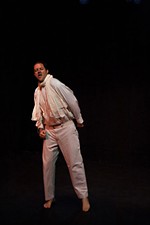Among Us
Why the gypsy feet of playwright Ruth Margraff keep wandering back to Austin
By Cyndi Williams, Fri., May 7, 2004

To look at Ruth Margraff, you might not suspect that she is a vital voice in shaping the future of American theatre. She has a shy angel face and dresses vintage. Her eyes are kind. She looks like she'd hold the door open for you or lend you a quarter for the parking meter. It's hard not to be dazzled by the down-to-earth yet pie-in-the-sky adorability of this woman you might see hiking along the greenbelt, eating chipotle at Polvo's, or catching a band at the Continental Club.
And yet this delicate-seeming figure is a warrior writer riding the vanguard of New Wave opera, pushing the boundaries of the stage with wildly imaginative prose and situations, fusing cultural influences from her travels to Guatemala, Japan, Ireland, Bosnia, Turkey, Switzerland, Russia, and other lands, and finding inspiration in sources as far-flung as martial arts, stealth bombers, crusader art, Evel Knievel, punk music, traditional carols, Times Square erotica, and Emily Dickinson.
Margraff's work might give you a little window into her dreams.
Currently on stage at the Off Center romps Stadium Devildare, commissioned and produced by Austin's Rude Mechanicals. Director Shawn Sides sees this collaboration as being about "martyrs and glorification of violence – the sexiness of violence ... structured as a symphony – four parts: allegro, andante, scherzo, allegro."
What the audience sees is an urban playground – open space, platforms, and rolling scaffolding – for four finely toned, finely tuned actors in action-ready costumes informed by Japanese animé and NASCAR racers. With Sides as a demonic narrator under a bubble bleach-blond wig. And Evel Knievel.
To the prosaic ears of an American, Margraff's language might sound like music. It works on you like a song, the way a song can take you from one emotion to another between one note and the next. It works on you like a dream, one of those dreams in which the mood is more memorable than the details.

Her layered melodic language, memorable imagery, and literal fireworks are what spark Stadium Devildare, not the spare plot. (See the excerpt, "Night Parachute Battalion.") But it does tell a story, a story about lovers and brothers, fighting in giant Godzilla suits and flying on motorcycles, racing cars and the rush to wars, suicide and going down in flames, sexism and patriotism. The rush of words and images and music seems impossible to fit into a taut hour and 10 minutes. A dramatic shift in tone in the final movement of the play (spoiler alert!) takes us from the frenetic red, white, and blue world where most of the action takes place into an unexpected white and curious, quiet and melancholy Japanese suicide ritual. The shocking change from actor Joey Hood in the coveted Evel Knievel suit chanting jingoistic patriotic patter under flashing lights, to the slow winding down of lovers in white kimonos dying a bloodless death challenges viewers to find their own connections. (For a review of Stadium Devildare, see Exhibitionism, p.??)
"Ruth's writing is poetic and dense and full of political passion – and funny. ... A most unique and unforgettable and bizarre and beautiful, beautiful night in the theatre." – Kia Corthron, playwright
Salvage Vanguard Theater Artistic Director Jason Neulander is a staunch Austin advocate of Ruth Margraff. In 1996, SVT premiered her opera Wallpaper Psalm, then revived it with a highly acclaimed production in 2000. In 1997, SVT commissioned and premiered Centaur Battle of San Jacinto, "an extended barroom brawl" riffing on Texas' fight for independence. Earlier this season, Neulander staged Margraff's holiday opera The Cry Pitch Carrolls – for the second time. Of her writing, he says, "I find myself not only engaged intellectually, but even more so, in an emotional way. Ruth's work has this sort of emotional integrity to it, these rich, deep, extreme sort of emotions. When we did Wallpaper Psalm again, I had two audience members independently tell me that before they saw Wallpaper Psalm, they never thought that theatre could be scary. They were actually scared by the production. And that, that's cool!"
Sides, who performed in the original SVT production of Cry Pitch and has looked at Margraff's work as an actor, an audience member, and a director, believes, "The audience is very free to create their own interpretive lens – like when you're listening to a piece of music or looking at an abstract painting or watching dance. That freedom for personal interpretation is rare in American theatre, and it welcomes the creative and intellectual presence of the audience. We are so accustomed to the conventions and rhythms of television. Ruth's work is a forum for exploring how theatre is distinct from the mediated spectacles that we are constantly bombarded by. There's a freedom to contemplate and meditate. But it's also very visceral and exciting, not meditative in the Zen sense."
Margraff's roots inform her work. Raised in a fundamentalist Christian home without television or popular music, Margraff's language evolved free of pop culture; instead, it was fed by religious ritual, music, and her frustrated poet mother, who read Emily Dickinson to Margraff and encouraged her to write.
Margraff feels a strong tie to this city. Why? Her reply sounds like it might have come from one of her characters: "Probably 'cause I'm crazy about Austin and especially Salvage and the Rudes! I've been coming down here every chance I get since Jason first brought me down in 1995. Just for my fix of music, chipotle, greenbelt, and all the giants here I like to watch get tall and come and go. Texas has grown into the grain of a lot of my strange fruit, too, with blood at the root. ... I think it turned me metal for a while, folk, and then American as I become more and more of a gypsy. Keeps pulling me under the spell!"
Margraff actually lived among us for a while, to teach playwriting at the University of Texas following the death of David Mark Cohen in 1997. She cites local inspirations in her work: a book called Form in Tonal Music that was holding up the air conditioner of her sublet in Hyde Park led to The Elektra Fugues; Centaur Battle came from watching Texas fistfights and seeing a knife roll out of a bartender's hand in what is now Little City.
But it wasn't long before Margraff's gypsy feet took her away. Since she presented her dark operetta Judges 19: Black Lung Exhaling at the 2001 FronteraFest, she has toured it to the 2003 Novaja Drama International Festival in Moscow and the Rembetika Music Conference on the Isle of Hydra in Greece. Lately she's been in New York a lot, writing a Greek opera, writing her own Balkan opera "to keep track of time," and there's that Noh play she's writing for Theater Nohgaku in Tokyo. She travels everywhere, like an electrifying idea. Still, Margraff always wanders back to Austin eventually.
"I love to write in Austin with the blazing hot daylight here," she says, taking a break at Little City, where it doesn't look like anyone's carrying a knife anymore. Having walked many miles in her own shoes, a sweet-faced woman in a vintage dress sits drinking iced coffee; she looks like she belongs right where she is, she looks like she could be dreaming of anything. ![]()
Stadium Devildare runs through May 16, Thursday-Sunday, 8pm, at the Off Center, 2211-A Hidalgo. For more information, call 476-RUDE or visit www.rudemechs.com.








